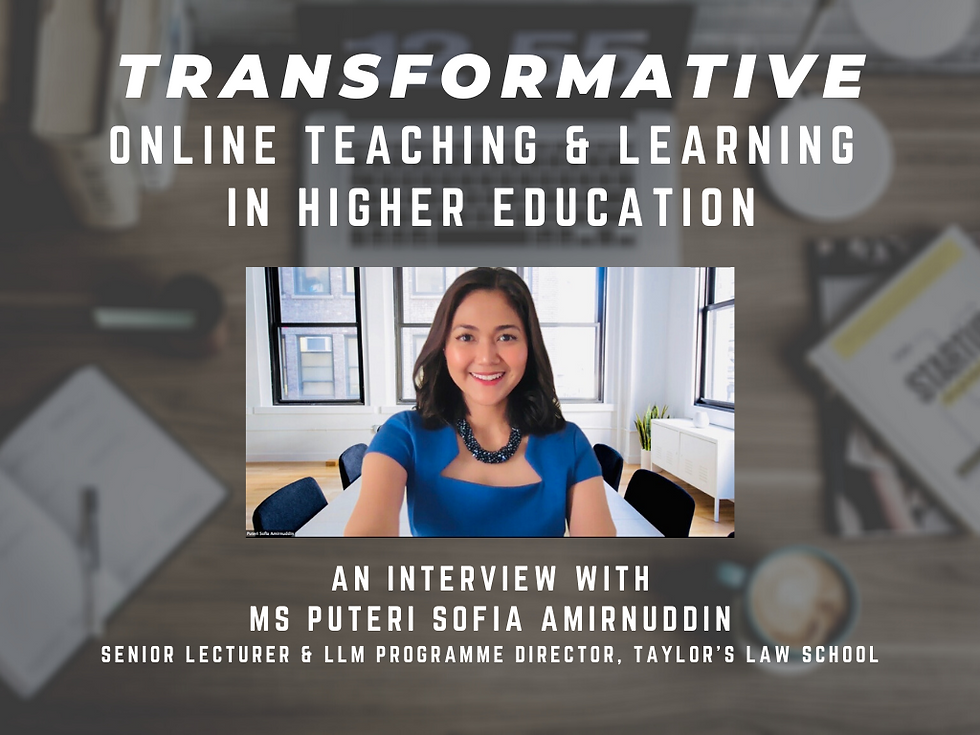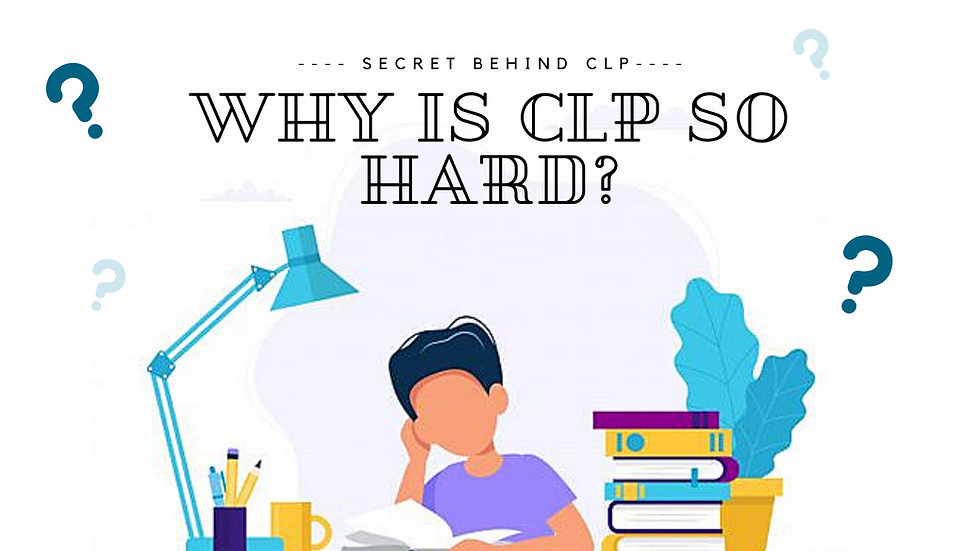Transformative Online Teaching & Learning in Higher Education
- Charmiane Foo
- May 31, 2020
- 7 min read
‘Research suggests that online learning has been shown to increase retention of information, and take less time...’
- World Economic Forum
The World Economic Forum (WEF) reported that over 1.2 billion children globally are out of the classroom as a result of the COVID-19 Pandemic. Thus, dramatically changing the landscape in education with a significant rise of e-learning.
With that said, it is then crucial to understand how higher education institutions like Taylor’s University are dealing with the shift away from in-class teaching and learning. With us here, is Ms Puteri Sofia Amirnuddin to help us understand the issue better.

In light of the pandemic, what do you think of the current situation in which most, if not all, learning institutions like Taylor’s University are conducting classes online? Is the current circumstance the push that was needed to bring more institutions to move towards virtual classrooms? What else needs to be done to bring more institutions to move towards virtual classrooms?
The current situation caused by COVID-19 pandemic has resulted in all lecturers, regardless in Taylor’s University or other higher education institutions, having taken the additional steps to be more innovative in how they deliver their lessons. The pandemic has shown that learning can take place either in person or remotely and that virtual classrooms are something that is worth considering when it comes to curating lessons in the future. COVID-19 has compelled all education institutions to adopt virtual learning in order to ensure that learning still takes place. Moving forward, I personally believe that education institutions can consider investing in various educational platforms so that lecturers can continue utilizing online platforms to deliver their lessons albeit virtually.
Has it been much of a change for you to be teaching 100% online compared to the previous mode of teaching where face-to-face teaching is supplemented with online resources? And what do you think of this change?
Taylor’s University has always encouraged lecturers to incorporate e-learning week every semester and it has started way back since 2014 or even before that. Lecturers will also need to provide a report on the hours spent on e-learning. At that time, it was a lot of work for the lecturers. Apart from teaching, we need to design our lesson to ensure that there is a balance of face-to-face activities and also online activities. For Taylor’s Law School, the lecturers will allocate Week 8 to be the special week where learning will be delivered online. This is to provide the opportunity for students to develop their self-learning or independent learning skills. Nonetheless, COVID-19 has indeed resulted in lecturers investing extra hours in designing the lesson for the March 2020 semester because online learning will take place starting Day 1! To me, it is an interesting challenge where I am required to alter my technique to ensure that students are receptive to online learning and that they will have a positive outlook on what is to come.
According to WEF, the sudden shift to online learning across the world, “some are wondering whether the adoption of online learning will continue to persist post-pandemic, and how such a shift would impact the worldwide education market”.
Do you think online classes in higher education will be continued post-pandemic? If yes, there may be a decline in virtual learning, hence do you think online teaching and learning should be further developed post-pandemic and how so?
COVID-19 pandemic is a game-changer where all education institutions are now looking into the possibilities of introducing online classes post COVID-19. The lesson that we learnt from this situation is that we need to be prepared for the next pandemic. We already survived SARS in 2003, H1N1 in 2009, MERS in 2012 but now all of us are facing the COVID-19 crisis whereby no one is sure when it will end. Hence it is a good initiative for lecturers and education institutions to continue developing their methods to deliver lessons online. There are various webinars on LinkedIn on online teaching and learning and it is good for lecturers and students to participate in the webinars to obtain insights by academics around the world.
Some students have voiced that their lecturers are merely reading from the slides in pre-recorded lectures while others applauded their lecturers’ efforts to make online learning fun and engaging. How do you think the lecturers in Taylor’s University have been coping with this switch in teaching mode? Have the new tools and facilities provided been well-utilised?
I honestly would not blame them. There are some lecturers who are novices in online learning but they could be an expert in the content of their presentation. In this kind of situation, it would be great if students can share their concerns with the lecturer or if not, perhaps to highlight it to the Programme Director. Taylor’s University has conducted various online sessions on online teaching, online assessment, online exams in order to equip lecturers before the semester started. Some lecturers are fast learners hence they can make that switch easily. However, there are some lecturers who are doing their best but would still require some support to deliver his/her lesson online. As far as I am aware, all lecturers in Taylor’s Law School are utilizing Microsoft TEAMS or Zooms to conduct synchronous lessons and have introduced a number of online activities to make their online classes more engaging and meaningful.
It is clear that students are required to adapt to the changes, but with different learning styles, how do you think this shift to online learning has impacted students? (e.g. some students prefer face-to-face interaction in class now have to watch pre-recorded lectures)
I am amazed to see how students can quickly adapt to the changes introduced by online learning. But as a lecturer, I am mindful that not all students are the same. What lecturers are encouraged to do is to select students randomly to get them to answer questions, to introduce online quizzes to determine students’ level of understanding and some even will ask students to switch on their video camera every 20 minutes. This will ensure that students are engaged in the lesson throughout the duration of the class. Usually, after the lesson, lecturers will upload the recorded lesson on TIMeS so that students can always revisit the lesson during their free time.
The lack of stable internet connection/coverage and the lack of proper access to materials has also been an issue faced both by the educators and students. This has contributed to unequal access to education especially those from lower-class families and rural areas, what do you think about this?
Recently there was a directive from the Ministry of Education for all learning including e-learning to be suspended in light of the COVID-19 pandemic. The reason behind the directive was because of the concerns regarding students coming from lower-class families who do not even own a mobile phone and students living in rural areas having limited or no access to internet connectivity. However, the suspension on e-learning has then been lifted which now allows learning to take place virtually. As much as I would want to help all students in these situations, I am limited to the resources that I have particularly when we are required by law to be confined at home. However, I believe that this is not a role for one person. This is something that all Universities need to look into so that these students are not left behind.
Another popular concern with online classes is the lack of hands-on practical classes especially for architecture, engineering and other science students – in your opinion, will it be practical to conduct online classes for students of these fields in the long run?
I have attended a webinar session that discussed this issue. Not all classes can be conducted online especially those that involve the use of particular equipment, laboratories, kitchens and other physical spaces. What I have learned from that session is that there are many lecturers who are very innovative! They are able to introduce a simulation exercise where students can participate in the lesson as if they were in the kitchen or lab. There are online platforms that provide for these simulations and lecturers can utilize it for the benefit of their students. Of course, it will not be the same as having hands-on practical experience but it is something that can be supplemented during times of crisis. Some schools have approached the matter differently by swapping the module that requires the use of physical facilities with another module that can be delivered online. Once it is safe for students to return to campus, then the students can opt for the module that requires the use of physical facilities in the following semester.
One of the most common comments given on online learning by students is that they find it challenging to concentrate during these online classes (especially with all the temptations and distractions found at home) – in a normal physical class, lecturers would be able to sense when students are getting restless and would give a break or would go straight to the main point, which may not happen with online classes (be it live or pre-recorded). What would you advise educators to do to help the students stay engaged in these classes and what approach has Taylor's Law School adopted to keep things interesting for its students?
I can imagine the challenges faced by the students to concentrate during online classes. My advice to educators around the world is to get creative! This is the time where we can challenge ourselves to try various approaches to teaching and learning in order to stimulate students’ thinking. Try to adopt case-based learning if it hasn’t been done before, try to introduce problem-based learning during class or even try to gamify their lesson! Lecturers can create a theme or story for one of the topics and get students to think in the roles assigned such as a detective, a judge, a spy or anything! When the students see the effort placed by the lecturers to make the session to be engaging or interesting, students would be more receptive to participate in the class activity. At least, that’s what I do for my classes.
Webinars have been a popular (and sometimes only) choice for everyone as an extra-curricular activity to conduct, what other extra-curricular activities do you think can be done online?
The possibilities are endless! It is really up to the imagination of that particular individual. For me personally, I have joined a social workout session on Instagram where anyone can join the training session and train together virtually. The best part is that it is completely complimentary! I am also aware that there are some law firms are providing opportunities for law students to conduct internships online. How amazing is that! At the end of the day, it is up to the person what skills he or she wants to develop and take the initiatives to follow through with that passion. Being confined at home doesn’t mean that everything stops. We just need to be creative on how we can best utilize our time.
Quoting Donna J. Abernathy, an educational author, “online learning is not the next big thing, it is now the big thing”. The Taylor’s Lexicon Team would like to express our heartfelt gratitude to Ms Puteri Sofia Amirnuddin for taking time out of her busy schedule to enlighten us on this subject. Thank you again, Ms Puteri Sofia, we can’t wait to feature you again for our future articles!



Comments